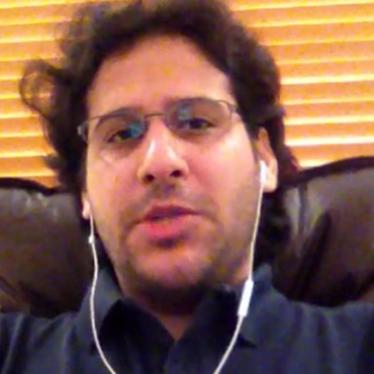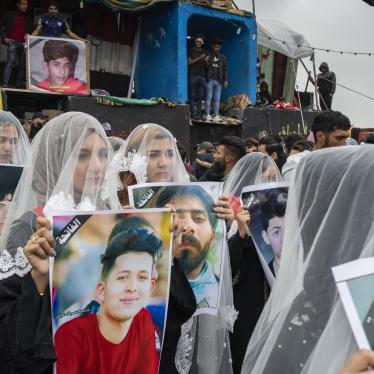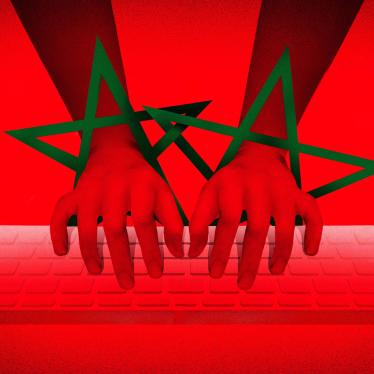The factional struggle behind the current presidential elections in Iran is having a devastating impact on human rights, Human Rights Watch said in a new report "Stifling Dissent: The Human Rights Consequences of Factional Conflict in Iran."
The 20-page report says that conservative-dominated institutions in Iran have used arbitrary detention, unfair trial, political violence, and restrictions on basic freedoms in order to prevent the reform movement from enacting its programs. These conservative institutions, which are not elected, include the Judiciary, the Council of Guardians and the office of the Leader of the Islamic Republic. They have launched a wave of repression against the independent media, opposition political activists, independent intellectuals, and reform-minded government officials.
The report says that fundamental changes are urgently needed to bring Iran's legal and administrative policies and practices in line with its obligations under international law.
Iran's presidential elections are scheduled for June 8.
"The heart of Iran's human rights problem is the judiciary, which is being exploited by one political faction against another," said Hanny Megally, Executive Director of the Middle East and North Africa Division of Human Rights Watch. "Without an independent judiciary, Iran's political life cannot be stabilized."
Human Rights Watch noted the extraordinary role of the Council of Guardians in vetting the "fitness for office" of prospective candidates for elective offices, including that of the president, and expressed concern that this process has ensured that elections in Iran have been largely limited to competition among those supporting the clerical leadership.
"Secular politicians and opponents of clerical rule are consistently prevented from standing in elections," said Megally. "There is also no transparency in the vetting process and no right to challenge the decisions of the Council of Guardians."
The report, "Stifling Dissent: The Human Rights Consequences of Factional Conflict in Iran," traces the conservative backlash after the reformists' landslide victory in parliamentary elections in February 2000. The first target was the independent print media, which had been the major engine of the reform movement. More than 35 independent newspapers and magazines have been closed down in the past fourteen months. Dozens of leading journalists, editors and publishers have been imprisoned on broadly defined charges of "insulting religious values."
The wave of repression has spread beyond the press. In April 2000, a group of leading reformists were detained after attending an international conference in Berlin. In October 2000, seventeen of them were brought to trial on vague charges of "conspiring to overthrow the Islamic republic." In January 2001, after an unfair trial, a revolutionary court imposed sentences of up to ten years' imprisonment on ten of the defendants, including a leading investigative reporter, Akbar Ganji, and women's rights activists Shahla Lahidji and Mehrangiz Kar.
In March 2001, supporters of the so called "religious-nationalist alliance," a loosely-knit political faction, came under attack. During March and April, more than 40 political activists were rounded up and taken into detention, where they were held incommunicado and accused of engaging in a plot to overthrow the government. The detainees included many supporters of the Freedom Movement, a previously tolerated political party that throughout its fifty-year history has been a consistent advocate of constitutional Islamic rule and respect for democratic principles.
Government officials associated with the reform movement have also been targeted. In March 2000, senior presidential advisor Saeid Hajjarian was gunned down in a Tehran street; the assassination attempt was traced back to government security agents. Former Minister of the Interior Abdullah Nouri, a leading reformist, is serving a five-year prison term imposed by a special clergy court. Mustafa Tajzadeh, a leading interior ministry official, has been dismissed from his influential post overseeing the conduct of elections. Ataollah Mohajerani, the influential former Minister of Culture and Islamic Guidance who had allowed the independent press to flourish, has been forced out of his position.
Human Rights Watch urged the immediate release of all those detained or imprisoned for their peaceful exercise of freedom of expression, and a lifting of the banning orders on newspapers. The organization also called for key amendments to the constitution and the press law and for changes in the procedures of Iran's Revolutionary Courts and Special Courts for the Clergy to bring them into full conformity with international fair trial standards.
Human Rights Watch said the outcome of the June 8 presidential election is unlikely to resolve the political struggles that have had such a destructive effect on human rights in Iran.
The report is available at https://www.hrw.org/reports/2001/iran/






